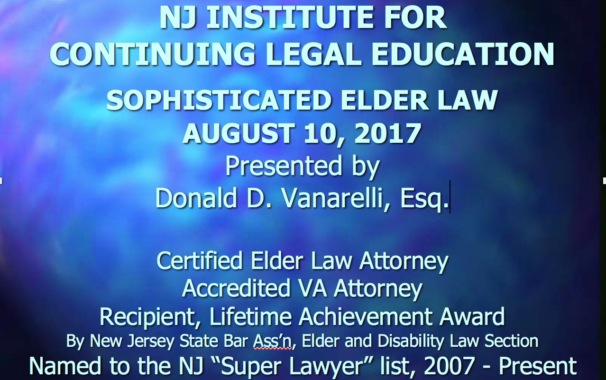
There were three Medicaid applications filed on behalf of E.M. The first was filed in 2012 by his daughter, after his admission to a subacute care center. At the time, E.M. was suffering from dementia and was on a ventilator and feeding tube. This Medicaid application was denied for failure to provide documents to Medicaid,.. read more →

D.G. was declared legally incapacitated, and her son was appointed as her guardian. Her son designated an attorney from the firm of Peluso, Castelluci & Weintraub as D.G.’s representative for purposes of a Medicaid application. The attorney filed a Medicaid application in April 2013. In July 2013, D.G.’s son (her guardian) died unexpectedly. D.G.’s daughter.. read more →

After A.S. entered a nursing home, her son T.S. applied for Medicaid benefits on her behalf, listing A.S.’s sister’s address on the application. In June 2013, because the necessary financial information was not provided, Medicaid notified T.S. that the application was dismissed, and that T.S. had a right to request a fair hearing. However, T.S… read more →

On February 1, 2016, a Medicaid application was filed on behalf of W.S. by Hammonton Center for Rehabilitation and Healthcare as his authorized representative. On June 21, 2016, the application was denied for failure to provide information necessary to make an eligibility determination. The information outstanding consisted of bank statements from an ING Direct account… read more →

Our law firm has created a number of Legal Guides for our clients and website guests to provide a better understanding of important and often complex legal subjects. The Legal Guides are offered free of charge. One of the Legal Guides available to the public discusses The Basic Rules of Medicaid Eligibility. For practical purposes, in.. read more →

The Achieving a Better Life Experience (ABLE) Act allows people with disabilities who became disabled before they turned 26 to set aside up to $15,000 per year in tax-free savings accounts without affecting his or her eligibility for government benefits like Medicaid and Supplemental Security Income (SSI). This money can come from the disabled individual.. read more →

Because K.K. was a legal permanent resident (LPR) of the United States before August 22, 1996, the Superior Court, Appellate Division, reversed a Medical denial based on the agency’s error in finding that the applicant “had not been a permanent resident for five years or more.” K.K. v. Division of Medical Assistance and Health Services,.. read more →

Join us, at our Law Office at 242 St. Paul Street, Westfield, NJ Free Seminar on Paying for Long-Term Care Friday, April 20th, at two (2) convenient times: 8:00 – 9:30 a.m., or 5:00 – 6:30 p.m. Many factors — illness, incapacity and the need for long-term care — can leave a family’s finances in disarray. Fortunately,.. read more →

Our law firm has created a number of Legal Guides for our clients and website guests to provide a better understanding of important and oftentimes complex legal subjects. The Legal Guides are offered free of charge. One of the Legal Guides available to the public discusses Special Needs Trusts and Special Needs Planning. Parents of children.. read more →
Upcoming Presentation on Special Needs Planning and Special Needs Trusts for Community Access Unlimited

Donald D. Vanarelli, Esq. (http://VanarelliLaw.com/) will provide an overview of the use of Special Needs Trusts (SNTs) by disabled persons so as to prevent an applicant’s financial assets and income from impacting eligibility for needs-based public benefits such as Supplemental Security Income (SSI), Medicaid, services from the Division of Developmental Disabilities (DDD), Section 8 Housing and.. read more →

A.M. appealed a gift penalty imposed by the Medicaid agency based on a transfer of assets. The penalty was imposed based on $100,000 in distributions to beneficiaries of an irrevocable trust established by A.M. with her assets. A.M. asserted that the transfer penalty was inappropriate because she established the trust and transferred assets into the.. read more →

Although it is common practice to add the name of a family member to a bank account as a convenience, the existence of a “convenience” account can have negative results when that family member applies for Medicaid benefits. In F.J. v. Division of Medical Assistance and Health Services, the applicant’s daughter testified that she opened.. read more →

A New Jersey appeals court upheld the denial of Medicaid benefits to an applicant who failed to provide necessary verifications, rejecting the claim that the Medicaid agency’s failure to assist with the application prejudiced the applicant. P.B. v. Division of Medical Assistance and Health Services (N.J. Super. Ct., App. Div., No. A-5405-15T2, Dec. 8, 2017). P.B.’s daughter.. read more →

Before Mr. Trotman was admitted to a nursing home, he resided in a home that he owned. He had difficulty maintaining the home and paying the bills, so his daughter began paying his bills in 2007. In December 2011, Mr. Trotman asked his daughter to assume full responsibility for the property, which then was also.. read more →

Ohio’s highest court suspended an attorney who advised his client to transfer assets in order to qualify for Medicaid and then lied to the state Medicaid agency about whether the client transferred assets. Stark County Bar Association v. Buttacavoli (Ohio, No. 2017-Ohio-8857, Dec. 7, 2017). Attorney Glen Buttacavoli’s law practice consisted of providing financial-planning advice.. read more →

Payments for Pre-eligibility Medical Expenses (PEME) are available to individuals eligible for Medicaid who reside in a nursing home (NH) or an assisted living facility (ALF). This blog post attempts to clarify the procedure for processing requests for payments of PEME made by or on behalf of residents of NHs and ALFs. Residents of NHs.. read more →

The Centers for Medicare and Medicaid Services (CMS) has released its Spousal Impoverishment Standards for 2018. The official spousal impoverishment allowances for 2018 are as follows: Community Spouse Resource Allowance The “community spouse resource allowance” is a protection provided under Medicaid law for the healthy spouse of an applicant for benefits (called the “community spouse”) to.. read more →

After being sued by Medicaid applicant in federal court, the Director of New Jersey Medicaid, who had previously denied benefits because the applicant transferred assets to a trust more than 5 years before, instead stated the application was denied because, under the terms of the trust, the trustee was permitted to pay the applicant’s rent… read more →

E.H. submitted a Medicaid application to the Hudson County Division of Welfare (HCDW) and designated Future Care Consultants (FCC) as her designated authorized representative (DAR). Shortly thereafter, the HCDW denied the application because E.H. failed to provide her husband’s bank records for the five-year look-back period. FCC appealed the denial, submitting a request for a.. read more →

Contrary to the recent decision in the G.V. v. Division of Medical Assistance and Health Services case which held that assets transferred to an Income Only Trust more than 5 years before a Medicaid application was filed were still available, rendering the applicant ineligible for benefits, the M.K. v. Morris County Board of Social Services.. read more →
Lawsuit for Unpaid Bills by Nursing Home Against Resident’s Power of Attorney Dismissed, and Attorneys Fees Awarded

A Superior Court judge in Ocean County dismissed a lawsuit filed by a nursing home for unpaid bills against a power of attorney appointed by a former resident, and ordered the nursing home to pay legal fees incurred by the power of attorney, ruling that the law prohibited the nursing home from requiring the power.. read more →

After being denied Medicaid because of a $70,000 joint bank account she maintained with her son, the Medicaid applicant, S.M., appealed the case to An administrative hearing. S.M. argued that Medicaid had failed to consider that her son was the sole source of $60,000 of those bank funds. After the ALJ affirmed Medicaid’s denial, and.. read more →
A New Jersey appeals court held that a Medicaid application was properly denied when the applicant did not submit all the financial information and documents requested by the Medicaid agency. P.N. v. Division of Medical Assistance and Health Services (N.J. Super. Ct., App. Div., No. A-2025-15T2, July 28, 2017). P.N. resided in an assisted-living facility. Based.. read more →

On August 10, 2017, I presented at the 2017 Sophisticated Elder Law Program on Medicaid litigation strategies. I provided an overview of various strategies and tactics which have been used successfully in litigation involving Medicaid and other needs-based public benefits in state and federal courts and in administrative agencies. I prepared a paper and PowerPoint slides.. read more →

Applying New Jersey’s filial support law, an appeals court in Pennsylvania affirmed a decision denying a Pennsylvania residential facility’s effort to hold the elderly New Jersey parents of an adult resident liable for the unpaid balance of his specialized services. Melmark v. Schutt (Pa. Super., No. 2253 EDA 2016, July 19, 2017). New Jersey resident Alexander (Alex).. read more →
Categories
- Affordable Care Act
- Alzheimer's Disease
- Arbitration
- Attorney Ethics
- Attorneys Fees
- Beneficiary Designations
- Blog Roundup and Highlights
- Blogs and Blogging
- Care Facilities
- Caregivers
- Cemetery
- Collaborative Family Law
- Conservatorships
- Consumer Fraud
- Contempt
- Contracts
- Defamation
- Developmental Disabilities
- Discovery
- Discrimination Laws
- Doctrine of Probable Intent
- Domestic Violence
- Elder Abuse
- Elder Law
- Elective Share
- End-of-Life Decisions
- Estate Administration
- Estate Litigation
- Estate Planning
- Events
- Family Law
- Fiduciary
- Financial Exploitation of the Elderly
- Funeral
- Future of the Legal Profession
- Geriatric Care Managers
- Governmental or Public Benefit Programs
- Guardianship
- Health Issues
- Housing for the Elderly and Disabled
- In Remembrance
- Insolvent Estates
- Institutional Liens
- Insurance
- Interesting New Cases
- Intestacy
- Law Firm News
- Law Firm Videos
- Law Practice Management / Development
- Lawyers and Lawyering
- Legal Capacity or Competancy
- Legal Malpractice
- Legal Rights of the Disabled
- Liens
- Litigation
- Mediation
- Medicaid Appeals
- Medicaid Applications
- Medicaid Planning
- Annuities
- Care Contracts
- Divorce
- Estate Recovery
- Family Part Non-Dissolution Support Orders
- Gifts
- Life Estates
- Loan repayments
- MMMNA
- Promissory Notes
- Qualified Income Trusts
- Spousal Refusal
- Transfers For Reasons Other Than To Qualify For Medicaid
- Transfers to "Caregiver" Child(ren)
- Transfers to Disabled Adult Children
- Trusts
- Undue Hardship Provision
- Multiple-Party Deposit Account Act
- New Cases
- New Laws
- News Briefs
- Newsletters
- Non-Probate Assets
- Nursing Facility Litigation
- Personal Achievements and Awards
- Personal Injury Lawsuits
- Probate
- Punitive Damages
- Reconsideration
- Retirement Benefits
- Reverse Mortgages
- Section 8 Housing
- Settlement of Litigation
- Social Media
- Special Education
- Special Needs Planning
- Surrogate Decision-Making
- Taxation
- Technology
- Texting
- Top Ten
- Trials
- Trustees
- Uncategorized
- Veterans Benefits
- Web Sites and the Internet
- Webinar
- Writing Intended To Be A Will







Vanarelli & Li, LLC on Social Media